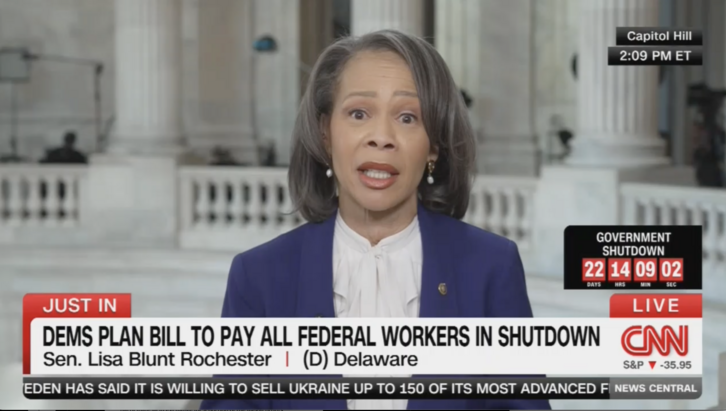October 23, 2025

Click here to watch the full interview.
Washington, D.C. – U.S. Senator Lisa Blunt Rochester (D-Del.) today joined CNN News Central to outline the consequences of the government shutdown and health care crisis Republicans are inching us closer to. Without further action by Congress, the average American may see their premiums more than double when open enrollment begins on November 1.
Below are excerpts of the interview.
On the Government Shutdown
“We as Democrats have been very clear about two things. We want to open the government, and we want to restore people’s health care. And so, while many of us are having conversations, the reality is this requires leadership, and the leadership of our House Democratic Caucus, Hakeem Jeffries, and Senator Schumer here in the Senate requested even a meeting with the President, which was denied. And he instead is going to another country. And so, for us, it’s important we can work on things here in the Senate. But we need a House that is actually in session, which they have been missing in action for over a month. And we need the President here to really make sure that there’s a deal. Again, we’ve been very clear…we’re at the table. We just need them to come to the table.”
On Restoring Health Care
“If I had one message for everyone and I’ve said this, I don’t know if the president is being kept away from the fact that people are hurting, whether it’s their cost in housing, whether it’s their cost in energy, food. We are literally on the precipice of health care costs, premiums doubling for most Americans, and primarily in red states. And so, we as Democrats are supporting people no matter where you are across the country and saying we want to open the government and restore your health care.”
“The question is when will Republicans in the House and the President come to the table on behalf of the American people? I’m ready, willing, and able.”
###
Senator Lisa Blunt Rochester represents Delaware in the United States Senate where she serves on the Committees on Banking, Housing, and Urban Affairs; Commerce, Science, and Transportation; Environment and Public Works; and Health, Education, Labor, and Pensions.
